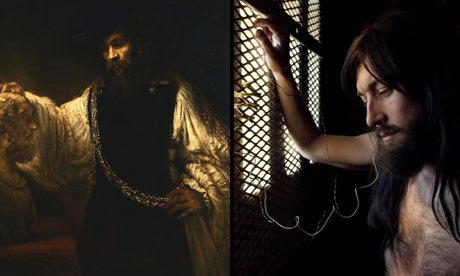
Steve McQueen's film Hunger is the answer to a lot of questions. Perhaps the most radical and pertinent is one asked by critic Dan Fox in an editorial in this month's issue of Frieze magazine: where's the beef? Where's the content in art now? As the world faces recession, will the clever-clever games of the art world continue to satisfy? Won't people want art to be about something?
Perhaps I've misrepresented his view here and merged it with my own. I've got to admit my own reservations about 21st-century art have often been stronger than any you are likely to find in a Frieze editorial. For instance, why does so much of today's art seem content to remain in an adolescent or unformed state, at once abstract and uncommitted - why is it so lacking in human depth? Spend five minutes in London's National Gallery and you will experience more humanity, more emotion, more of life than you can taste in a hundred art fairs. Why can our artists not rise to those heights, sink to those depths? Where's our Rembrandt?
Oh, wait, here he is. Watching the extraordinary theatrical dialogue between two men whose faces are cast in deep shadow that is the heart of McQueen's film, I found myself thinking of Rembrandt. It was the sense of life's seriousness, the reverent attempt to respect and communicate the mystery of selves, the vividness of life and death, that made the comparison seem justified. Other artists, of course, spring to mind, and some of the greatest film-makers.
McQueen's treatment of prison life has something in common with Robert Bresson's A Man Escaped and - more crucially - his subversive concept of time makes you think of the Russian master Andrei Tarkovsky. Not that Hunger is "influenced" by those directors in some immature way. If McQueen's brilliant looping temporal poem is reminiscent of Tarkovsky this is quite possibly a dialogue of equals. And how good does that make McQueen?
Well, I've already compared him with Rembrandt. The reason such lofty echoes hang in the cinema's darkness when you watch this film is not that it is visually brilliant but that it is such a rich, nuanced, profound examination of life. It is not "arty" in a pejorative sense - unless you think Pasolini's Gospel According to Saint Matthew and Scorsese's Raging Bull are arty, in which case there's no hope for you. Hunger is not the work of an artist playing at being a film director but of a great cinema artist who happened to get his start in the world of galleries. It is not the promise but the promise fulfilled.
And yet it is, also, a work that could only have been made by a graduate of the Turner prize and the freedom that film installation gives artists to experiment. After all, where else would a British Tarkovsky come from? Our film industry has always - I mean, always, going back a century - been a compromised mixture of cynical commerce, theatrical snobbery, and literary pretension. McQueen simply seems to come from another place - but a place in Britain - where you can think as profoundly as a Russian film-maker about the kinds of stories we are used to seeing. By comparison The Crying Game or In The Name of the Father seem like ludicrous pantomimes.
Hunger is, finally, an answer to the questions - is the Turner prize really about discovering talent? Does all this art that is so vaunted in modern Britain amount to anything? A talent like this is rare and without the Turner prize, without the world of contemporary art in all its vanity, Hunger would not exist. The same goes for to this year's Turner, whose frontrunner is the film-maker Runa Islam. In many ways her work reminds me of his - certainly in its clarity of thought. So here is a reason she must get the 2008 Turner prize: to continue the great new wave of film-making led by McQueen and Douglas Gordon.

